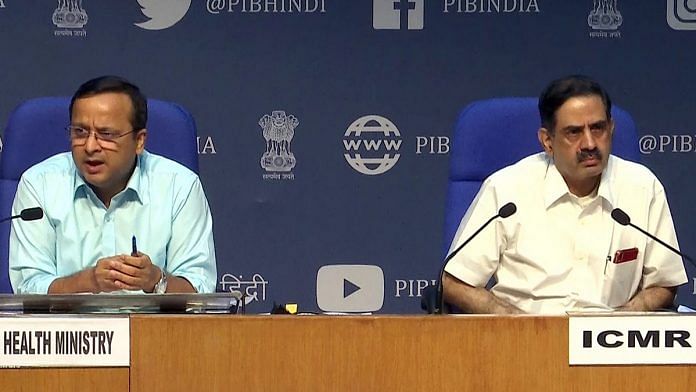New Delhi: A day after the World Health Organization suspended the hydroxychloroquine (HCQ) arm of its global solidarity trial, the Indian Council of Medical Research (ICMR) said it would continue to recommend the drug as a preventive therapy against Covid-19.
“Based on looking at the risk/benefit, we found that possibly we should not deny (HCQ) to the frontline and healthcare workers who are going to be dealing with the patients of Covid,” Dr Balram Bhargava, ICMR’s Director General, said in a press briefing Tuesday.
Bhargava’s statement comes amid rising concern over the drug following a study in The Lancet which found links between the use of chloroquine and hydroxychloroquine and increased mortality rates and development of irregular heart rhythm among Covid-19 patients. However, the ICMR has made it clear that it is backing HCQ as a preventive measure, while the study in The Lancet was about its effectiveness in Covid-19 treatment.
WHO Director-General Tedros Adhanom Ghebreyesus said in a virtual press conference Monday that the trial of HCQ will be on pause until safety data on the anti-malaria drug is reviewed.
Bhargava, however, refrained from commenting on either The Lancet study or WHO’s move.
Also read: Study suggests HCQ does not significantly reduce risk of severe infection in Covid patients
ICMR’s HCQ defence
According to Bhargava, the initial decision to recommend the drug back in March had been based on in-vitro studies that had proved its anti-viral properties. In-vitro studies, also called test tube studies, are performed with biological molecules in a laboratory.
“It was a very popular drug when the American government got it fast-tracked and we thought it may be useful for prevention and taking its biological plausibility, the in-vitro data and the availability and safety of the drug, we recommended it for empiric used under strict medical supervision,” Bhargava said.
He further said that case-control and observational studies were done at the All India Institute of Medical Sciences (AIIMS), the ICMR, and also in three public hospitals in Delhi. The studies Bhargava mentions have also been referred to in its 22 May advisory expanding the preventive use of HCQ.
“It was very difficult to do a randomised trial of something which we say may benefit. So a randomised trial was not possible, we looked at the data from these observational studies as well as the case-control studies. And we found maybe it is working, we found there were no major side effects except nausea, vomiting and some palpitations,” he said.
The ICMR has faced criticism for green-signalling the widespread preventive usage of HCQ as without the backing of published and peer-reviewed studies.
ICMR won't reveal the name of the hospital or the methodology, nothing seems to published. A few observations suggest that prophylactic HCQ prevents coronavirus & data is collected from hospitals. How are patients in hospitals if they are not infected? https://t.co/oeyCIpe1d2
— Dr Sumaiya Shaikh (@Neurophysik) May 23, 2020
While the role of #HCQ in hospitalized patients with #COVIDー19 seems increasingly nil, whether this works as preventive therapy is unknown. #Indian #ICMR has released a statement saying that #HCQ #PreP in HCWs had lower rates of COVID. Short on details. https://t.co/4H0kUZx7n1
— David Boulware, MD MPH (@boulware_dr) May 23, 2020
India’s Covid-19 numbers improving
At Tuesday’s press briefing, Joint Secretary in the Health Ministry Lav Agarwal said that a total of 67,490 people have recovered from the infection, bringing the recovery rate to 41.61 per cent. The fatality rate, i.e. the proportion of deaths over the total number of cases, has also fallen from 3.3 per cent to 2.87 per cent.
“If we compare our figure to the world, if across the world 69.9 cases per lakh population have been reported, then in India it is 10.7 per lakh cases,” Agarwal said.
He also compared this figure to that of Spain, which had reported 504 cases per lakh population; Belgium, which reported 499.8; the US, which reported 486.88; and Mexico where 52.2 cases were reported per lakh population.
India also had the lowest deaths per lakh population at 0.3 deaths, according to the health ministry’s graph presented during the briefing.
“Whatever success we’ve gotten in India is because of the people’s support. It is important to continue this effort and, until a new vaccine is developed, we make physical distancing a part of our lives,” Agarwal said.
To a question about whether the government is declaring victory too soon given predictions that the situation may worsen in the coming months, Agarwal responded: “We are not declaring victory. At all points of time, we said we are in a battle…. All we are trying to tell you is that we are not immune from the virus.”
Also read: Hydroxychloroquine: The special drug Trump and the world are dialling PM Modi for




Yes, ICMR advisory on expanding HCQ use among frontline workers is for prophylactic use, whereas the pessimistic studies being cited are in regard to possibility of curative use. Big difference. ICMR isn’t claiming HCQ to be a cure for those who are already infected badly. No cure has been found yet. Such patients will need much more specialized treatment.
The ICMR advisory:
https://main.icmr.nic.in/sites/default/files/upload_documents/V5_Revised_advisory_on_the_use_of_HCQ_SARS_CoV2_infection.pdf
Methinks that China is arm-twisting WHO again to denigrate HCQ so that more people in the west die without HCQ. Never underestimate the diabolical mind of the communists in China!